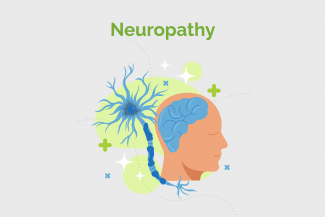
A clinical examination is essential to the diagnosis of neuropathy. This will include a thorough medical history (social habits, alcohol/tobacco use, risk of infections, family history etc.), physical exam, and a neurological exam to test the reflexes of the motor and sensory nerves.
If suspected of any specific diseases, a blood test may be ordered for diabetes, vitamin deficiency, liver and kidney function etc. In addition, scans such as CT or MRI may be done to investigate the cause of damage to the nerves.
Other nerve functions testing will include an Electromyography (EMG) and a Nerve conduction velocity test (NCV). In certain patients, aninvasive test such as nerve or skin biopsy may be performed if the neuropathy is of unknown etiology.
Genetic tests (for specific genes) are available for people who are suspected to have inherited neuropathies based on family history.





